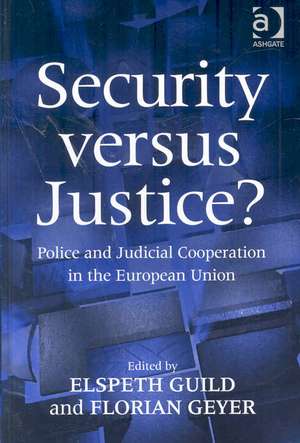Security versus Justice?: Police and Judicial Cooperation in the European Union
Autor Florian Geyer Editat de Elspeth Guilden Limba Engleză Hardback – 28 mai 2008
Preț: 826.32 lei
Preț vechi: 1106.53 lei
-25% Nou
Puncte Express: 1239
Preț estimativ în valută:
158.12€ • 165.42$ • 131.35£
158.12€ • 165.42$ • 131.35£
Carte tipărită la comandă
Livrare economică 02-16 aprilie
Preluare comenzi: 021 569.72.76
Specificații
ISBN-13: 9780754673590
ISBN-10: 0754673596
Pagini: 352
Dimensiuni: 156 x 234 mm
Greutate: 0.81 kg
Ediția:New.
Editura: Taylor & Francis
Colecția Routledge
Locul publicării:Oxford, United Kingdom
ISBN-10: 0754673596
Pagini: 352
Dimensiuni: 156 x 234 mm
Greutate: 0.81 kg
Ediția:New.
Editura: Taylor & Francis
Colecția Routledge
Locul publicării:Oxford, United Kingdom
Recenzii
'An excellent and highly readable guide on the essentials of police and judicial cooperation in the European Union. Presents a comprehensive, analytic and balanced portrait covering a variety of themes in a rapidly changing legal landscape...a vital source of reference for students, researchers and policy makers in this field.' Gert Vermeulen, Ghent University, Belgium
Notă biografică
Elspeth Guild is based at the Centre for European Policy Studies, Brussels, Belgium and is a Professor of European Migration Law at Radboud University, Nijmegen, The Netherlands. Florian Geyer is based at the European Commission, Brussels, Belgium.
Cuprins
Chapter 1 Introduction: The Search for EU Criminal Law—Where is it Headed?, Elspeth Guild, Florian Geyer; Part 1 Actors; Chapter 2 Security, Freedom and Accountability: Europol and Frontex, Sonja Puntscher Riekmann; Chapter 3 Eurojust—A Cornerstone of the Federal Criminal Justice System in the EU?, Ji?í Vlastník; Chapter 4 The Third Pillar and the Court of Justice: A “Praetorian Communitarization” of Police and Judicial Cooperation in Criminal Matters?, Eulalia Sanfrutos Cano; Chapter 5 EU Member States’ Complicity in Extraordinary Renditions, Judit Tóth; Part 2 Concepts and Instruments; Chapter 6 EU Police Cooperation: National Sovereignty Framed by European Security?, Didier Bigo; Chapter 7 Too Different to Trust? First Experiences with the Application of the European Arrest Warrant, Julia Sievers; Chapter 8 Reflexive Governance and the EU Third Pillar: Analysis of Data Protection and Criminal Law Aspects, Gloria González Fuster, Pieter Paepe; Part 3 Law and Policy; Chapter 9 The Competence Question: The European Community and Criminal Law, Valsamis Mitsilegas; Chapter 10 The Proposal for a Council Framework Decision on Certain Procedural Rights in Criminal Proceedings throughout the European Union, Mar Jimeno-Bulnes; Chapter 11 The “Prüm Process”: The Way Forward for EU Police Cooperation and Data Exchange?, Rocco Bellanova; Part 4 Practice—Achievements and Obstacles; Chapter 12 Policing a European Border Region: The Case of the Meuse-Rhine Euroregion, Toine Spapens; Chapter 13 Uniforms without Uniformity: A Critical Look at European Standards in Policing, Peter Hobbing; Chapter 14 Third Pillar Developments from a Practitioner’s Perspective, Richard Lang; Chapter 15 The EU Counter-Terrorism Strategy and Human Rights in Central Asia: Do as I Say Not as I Do?, Susie Alegre; Part 5 A Possible Future; Chapter 16 The Reform Treaty and Justice and Home Affairs: Implications for the Common Area of Freedom, Security and Justice, Sergio Carrera, Florian Geyer;
Descriere
One of the most dynamic areas of recent EU law has been cooperation in the fields of policing and criminal justice. This book enables readers to understand the changes that have taken place by examining how and why they occurred, along with the subsequent outcomes.









